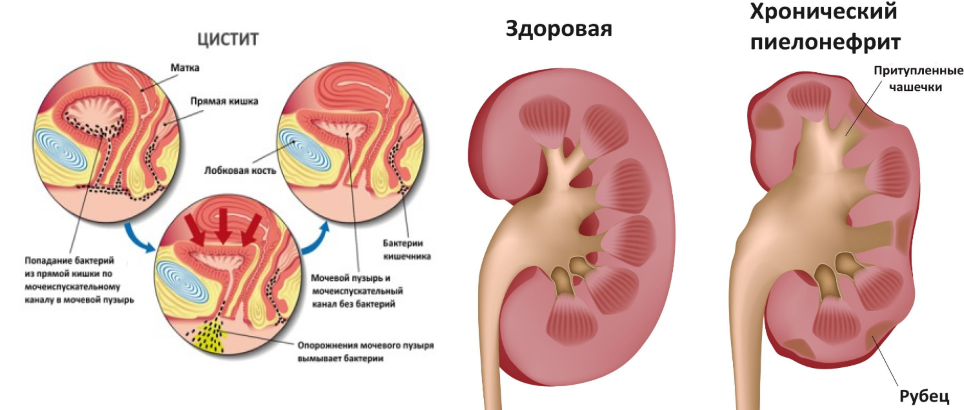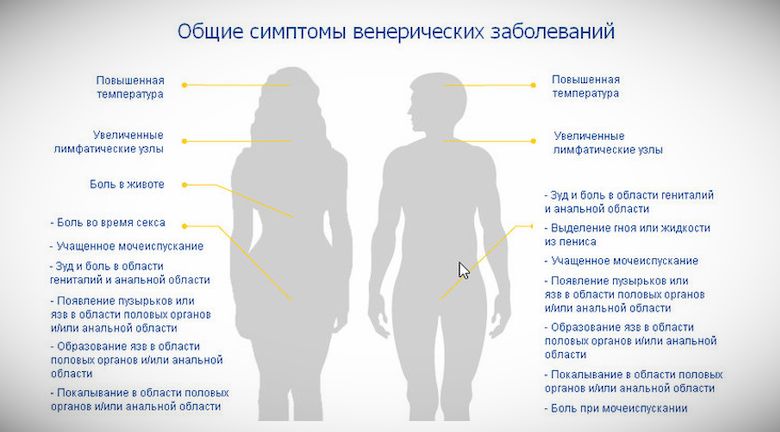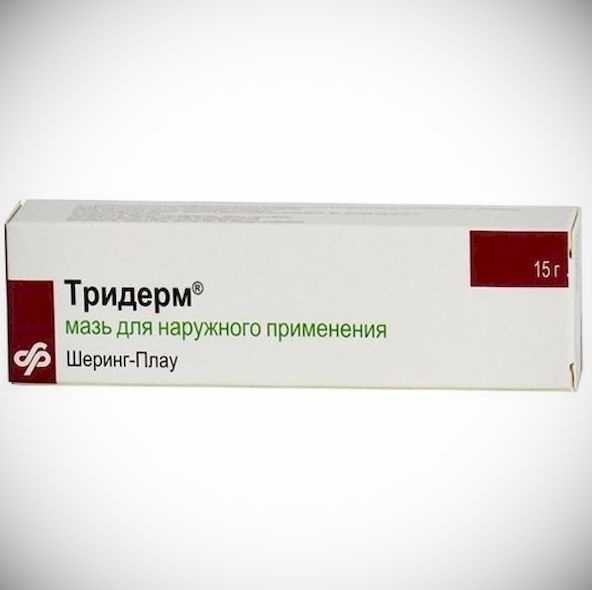Severe itching in the intimate area in women. How to get rid of an unpleasant sensation in an intimate place in women? There are unpleasant sensations in an intimate place, what to do
Perineal pain occurs in women of any age. They can be independent, or they can be accompanied by additional symptoms worth paying attention to. In addition, you need to monitor the course of the disease, the nature of the pain: aching, sharp, throbbing, pulling, short, fast, long and other criteria. When an intimate place in women hurts, it is imperative to consult a doctor. It just won't hurt. This could be a signal that it is developing serious illness, so it is better not to delay going to a doctor's consultation.
Perineal pain: causes
The intimate place in women hurts different reasons... Of course, pain can occur on its own as an allergic reaction to drugs, contraceptive methods and medical procedures, on the synthetic fabrics underwear... Also, not only synthetic underwear, but also dense and rough fabric (for example, jeans) can irritate a place in this area. In such cases, it is necessary to remove the product that causes the allergy.
Also, pain in this area in women can develop due to pregnancy and upcoming birth and also after them. This is due to deformations internal organs and the pelvis, which are essential for a safe delivery. However, it is better to consult a doctor - should there be pain on this period pregnancy and whether they have the right character. Also, pain can be caused by menstruation. For many women, it is excessively plentiful in the first days, so it is better to drink a pain reliever, which the doctor will prescribe.
However, there are more scary cases when groin pain develops. Most often it is caused by injuries in the groin, inflammatory processes in the vagina, glands and other genitals. Pain may also appear in case of problems in excretory system(kidneys, bladder etc). Pain is also caused by abscesses, cancer, skin diseases and gastrointestinal problems.
Pain in the perineum in women as a symptom of other diseases
When an intimate place hurts in women, it can be a symptom of any other disease. Most often, a woman thinks that if the pain is in the perineum, it means that there is a reason, but in fact, the reasons may be in another place, and the pain just radiates to the groin.
If sharp sharp pains, which are exacerbated during urination, are given not only to the groin, but also to the legs, you constantly want to go to the toilet, there is nausea and vomiting, then these may be symptoms of colic in the kidneys. The woman urgently needs to be taken to the hospital.
Pain can be given to the groin and with diabetes mellitus. It can also be a signal of the presence of an infection in the body. If the nerve is pinched, then pain will also occur. In some cases, with cancer, pain also extends to the intimate area. With abscesses and hematomas in this area, the pain may increase. In case of problems with the gastrointestinal tract, pain is also given to the groin.
Treatment of perineal pain in women
When the intimate place of women hurts, endure sharp pains is strictly prohibited. To temporarily get rid of pain, you can drink strong pain relievers such as Spazmalgon and Analgin. But you should not get carried away with them - it is better to quickly consult a doctor, tk. it is not so easy to get rid of pain: you need to find the cause, establish a diagnosis and prescribe full course treatment.
If the cause is pregnancy, this is temporary and the pain will go away. The main thing is to tell your gynecologist about this. If the pain is associated specifically with future childbirth, then it will go away later.
But other diseases, such as thrush, vaginitis, abscess, affected nerves, etc., must be treated only by a doctor. He will select the necessary drugs and procedures to completely cure the patient.
Also, women experience pain after intercourse. It is better to consult your doctor about this.
To prevent pain, it is easier to carry out prevention various diseases... Dress warmly, wash every day, use comfortable clothes and underwear made from natural fabrics. It is also important to undergo preventive consultations with a gynecologist.
When women start having pain in the perineum, it is imperative to consult a doctor. This will help prevent more serious diseases of the liver, kidneys, urination, problems with the genitals, and more. In such situations, self-medication is strictly prohibited. The only thing that is allowed is with strong and acute pain drink a pain reliever, after which you need to rush to the doctor. Only a doctor can determine the diagnosis and choose correct treatment... Of course, you can also consult on the account of the application folk methods treatment and prevention, because they have shown their effectiveness and reliability, but a serious illness is difficult to cure with them.
Many women and men at absolutely any age are faced with this delicate problem... By themselves itching, burning and what itches in intimate area not a disease, but are its harbingers. They can deliver a lot of unpleasant sensations to their owner. If it itches, burns, itches in intimate place it is worth taking a few important steps, to prevent the development of more dangerous diseases.
Where to start and what to do if an intimate place itches?
It is necessary to analyze and understand what could provoke the itching. Try to answer yourself a few questions:
- what kind of underwear do you wear;
- what personal hygiene products do you use;
- have you recently visited a sauna, bathhouse, swimming pool;
- was the accidental unprotected sexual contact; what diseases of internal organs do you have;
- have you taken antibiotics?
Determine if you have any other signs other than itching in the intimate area: burning, redness, rash, discharge, changes in the menstrual cycle.
Further in the article, we will return to the question more than once: in order to understand what steps to take and not be mistaken with the choice. 
Why the intimate place itches, itches: causes, diagnostic methods
Identifying the cause, i.e. the underlying disease. Timely and correct treatment, in turn, will help eliminate discomfort in the form of itching and burning.
There are several mandatory diagnostic methods:
- general analysis of blood and urine;
- bacteriological and cytological examination of smear;
- biopsy and histology;
- In case of prerequisites for a relationship with other diseases, additional examinations may be assigned:
- blood sugar test;
- Ultrasound of the kidneys and bladder;
- tests for bilirubin, liver enzymes, total protein.
- and other analyzes.
So, we found out that itching in the intimate area is caused by various reasons... You should talk in more detail about each. 
If you only have itching, perhaps a slight redness with no other symptoms, this is most likely:
- Allergy to personal hygiene products, laundry detergents, medicines, depilation products.
- Poor hygiene, which refers to misuse tampons or pads, wearing a thong regularly, using toilet paper with flavors, regular soap or body gel for intimate hygiene.
- Change hormonal background during pregnancy, which can promote the growth of harmful bacteria in the vagina. Therefore, it is during this period that it is necessary to regularly visit the gynecologist.
When symptoms are added profuse discharge, but odorless and colorless, perhaps you have:
the period of ovulation, the approach of menstruation, puberty a teenager sex drive, as well as during and after intercourse.

If pain appears:
structural disorders - prolapse of the walls, damage to the mucous membrane (during douching, examination, abortion, after childbirth); ovarian disease; atrophy of the vaginal walls; impaired blood supply to the pelvic organs.
In the case of the presence, burning, smell, discharge of a certain color, we can talk about the presence of:
- Infections (chlamydia, genital herpes, trichomoniasis, urinoplasmosis). Among additional features: burning sensation when urinating, unpleasant Strong smell, rash.
- Fungal disease (candidiasis or thrush) bacterial vaginosis with white, cheesy discharge, sour smell, pain during and after intercourse.
The presence of dryness in the vagina may indicate menopause and a disease characteristic of this period - atrophic vulvitis.
If it itches in an intimate place due to the presence of other diseases of internal organs, then symptoms characteristic of them are added to the symptoms:

Itching in an intimate place outside: why and what to do?
It is worthwhile to dwell separately on the moment when it itches in an intimate place outside and find out what to do in this case. If this is not an ordinary allergy, as described above, then it is possible a sign of vulvitis. This disease develops as a consequence of accidentally inflicting external injuries on oneself: when shaving, epilating, masturbating, douching. Among the signs are:
- inflammation and pus in wounds, swelling and red spots on the mucous membrane, purulent discharge, fever, itching and burning of the mucous membrane.
Itching in an intimate place inside: what could it be?
In principle, with any of the aforementioned diseases, it can itch both outside and inside the vagina. But special attention deserves oncology. After all, cancer has become a real scourge in our time. In this case, itching and burning indicate the development and growth of polyps, fibroids, cysts, fibroids. Pain and sudden weight loss are added to the symptoms. Remember, if it itches in an intimate place inside, it could be a sign of cancer. If there is even the slightest suspicion, immediately contact a specialist. 
Itching, dryness, irritation, redness in the intimate area in men
Deserves special attention in the male. Itching, dryness, irritation, redness in the intimate area bother them no less than women. But often they pay little attention to this, complicating the course of the disease.
As in the case of the female sex, these can be:

In the case of men, a number of additional reasons can be distinguished:
- Prostate disease. Provoke her hypothermia, over-active sex life or abstinence, alcohol, stress, stones, and swelling in the prostate gland.
- Symptoms: pain in the anus, lower back, lower abdomen, scrotum; , during or after intercourse.
- Inguinal epidermophytosis - the disease occurs in men several times more often than in women. You can get infected with it in a household way when visiting public bath, saunas, through linens, toilet seat. Epidermophytosis contributes to the development of eczema, dermatitis, asthma by making the body more susceptible to allergens. The disease affects the groin, pubic skin and inner thighs, and much less often the penis and vaginal mucosa.
- Symptoms: the rash has a reddish-brown appearance, such spots are peeling and have an outline in the form of arcs.
- may indicate balanitis i.e. inflammation of the foreskin.

Itching in the intimate area: treatment and prevention
As we already understood, a lot of reasons can provoke itching in the intimate area, but of course there is a treatment. Let's talk about it in more detail.
If you are allergic, antihistamine tablets and ointments (Suprastin, Tavegil, Loratadin, La-Cree, Triderm) will help relieve the itching in the intimate area.
How to get rid of itching in an intimate place in the case of a sexually transmitted or infectious disease, will only tell qualified specialist... A venereologist, urologist, gynecologist will prescribe antibiotics of complex action in injections or tablets, immunostimulants.

How to remove itching in an intimate place with menopause? Gynecologists focus on hormonal preparations based on estriol (Estrovel, Ovestin).
Often to eliminate severe itching in the intimate area, in complex therapy prebiotics are used (Acelact, Vaginorm S, Lactobacterin). They are used to restore the microflora of the vagina.
As a prophylaxis and as part of complex therapy, douching, lotions, intimate baths (Miramistin, Chlorgiksedin, decoctions medicinal herbs, boric acid, live lactobacilli, "Tantum Rose").
Remember prevention: use special means for personal hygiene, use hypoallergenic washing powders, do not wear thongs, protect yourself, visit a gynecologist and urologist at least once a year, wash yourself at least 2 times a day, use public toilets and baths more carefully.
The fair sex should not be intimidated, remembering that discharge in the intimate area must be present. This indicates the correct and healthy functioning of the vaginal mucosa. Excessive discharge that has a specific color and odor is a cause for concern. In this case, you should be wary and seek professional help. Do not self-medicate and before each use medicinal product read the instructions carefully.
Be healthy!

Why does an intimate place itch? - delicate question which many are embarrassed to talk about.
Navigation through the article:
- An intimate problem.
- Itching in an intimate place - the reasons.
- An intimate place itches, what to do?
- Itching in an intimate place - treatment.
- If the problem occurs during pregnancy.
These groups do not have clear boundaries and, in turn, are subdivided into whole line reasons that can cause itching or burning.
It is important to remember: if this symptom does not go away within 3-7 days, you should definitely consult a doctor. Itching can be an indicator of a serious illness or infection.
External causes of itching and burning
The first thing a woman should think about when feeling an itch: is synthetic underwear causing it? Wearing cheap synthetics is the most common reason discomfort in intimate organs... To eliminate it, it is enough to stop using linen made from irritating fabrics or buy panties with a cotton gusset. There are other external influences capable of causing discomfort.
1. Violation of hygiene rules, inability to carry out hygiene procedures in a timely manner.
The female genital organs secrete a secret that is insignificant quantities accumulates in intimate places. There he can come into contact with dust entering the laundry, sweat. The result is a favorable environment for bacteria to grow. In this case, itching is caused by the results of the vital activity of bacteria and microorganisms.
Itching and burning with discharge in women
Sometimes women, along with sensations of itching and burning, can observe the presence of vaginal discharge. IN healthy condition vaginal discharge in women is the norm and is not accompanied by discomfort. If itching, burning, discoloration and external characteristics appear, it is imperative to consult a gynecologist. Itching, burning, discharge in women can signal the occurrence pathological processes and diseases of the genital area.
There are several gynecological diseases symptoms, which may include burning, severe itching, and white discharge:
Candidiasis or thrush
The infection is caused by a fungus of the genus Candida. The cause of thrush can be taking antibiotics, infection from a sexual partner, decreased immunity and hormonal disorders... Often the disease is observed in people suffering from diabetes mellitus and other diseases that compromise the immune system.
The main symptoms of thrush are:
- Itching and burning.
- White cheesy discharge.
- Sour smell.
- Pain when urinating.
- Bacterial vaginosis.
Treatment involves the use of antifungal drugs that help neutralize and destroy the fungus. It can be pills vaginal suppositories and ointments. It is important that both sex partners undergo treatment.
It should be remembered that a woman's vagina is normally constantly present microbial flora which is harmless. However, an imbalance between individual representatives of the vaginal microflora can cause the development of diseases. For example, excessive reproduction of a fungus from the genus Candida causes the development of thrush (candidiasis), the active reproduction of a microorganism called gardnerella leads to the destruction of normal microflora and the development bacterial vaginosis(vaginal dysbiosis). A characteristic feature two of these diseases is itching and burning in the genital area.
Treatment of burning and itching in women
- Itching with hormonal imbalance. Speaking about hormonal fluctuations, it is worth noting that in women, the hormonal background is subject to significant jumps throughout their life - this is due to those natural processes that occur in the female body. The most frequent fluctuations in hormones a woman feels in connection with menstrual cycle so there is such a leap every month. Also serious hormonal changes occur during pregnancy, after childbirth, during menopause. At this time, the mucous membrane of the genital organs changes somewhat in terms of acidity. This leads to the activation of pathogens and the appearance of unpleasant sensations in the genital area.
- Itching with menses. During menstruation appear bloody issues, which are an ideal breeding ground for bacteria. In addition, it is more difficult for the female body to resist the danger at this time, since the immune system is weakened. If the sanitary napkins are changed out of time, then this threatens the appearance of burning and itching. Perfect timing for tampons - 2 hours, then they need to be changed, the pads should be changed after 4 hours.
- Itching during pregnancy. Burning and itching in the genital area during pregnancy occurs quite often. This is primarily caused by a decrease in immunity and a change in hormonal levels. As a result, pathogenic bacteria are activated, causing unpleasant sensations. In order to eliminate the symptoms, the pregnant woman needs to see a doctor who will conduct a series of tests and identify the exact cause of the itching. This will help not only to cure the disease in time and correctly, but also to preserve the life and health of the future baby.
- Itching after childbirth. With the end of pregnancy and childbirth female body will return to its normal state, which means that the hormonal background will change again. Besides postpartum discharge by no means contribute to a favorable situation in the genital area. It is quite easy to combat postpartum itching, as there are a number of medications that can be taken during lactation.
- Itching with menopause. In women over 50, the level of sex hormones is noticeably reduced. This indicates the onset of menopause and the restructuring of the entire hormonal background. Against the background of such changes, a woman develops a dry vagina, and becomes drier skin in the thighs and labia. The woman becomes irritable, overly whiny, her mood changes dramatically. All these factors - both physiological and psychological - contribute to the appearance of itching and burning of the genitals. Of course, this condition does not occur in all women in the postmenstrual period, but those who experience itching experience from it significant discomfort... To eliminate these symptoms, it is enough to take medications prescribed by a doctor, observe the rules of personal hygiene. (See more in the article "Menopause in women")
- Itching and burning with epidermophytosis inguinal. The reasons for the appearance of this disease are non-observance of the rules of personal hygiene and the use of objects common with a sick person, for example, common washcloths, linen, oilcloths. There is a high risk of infection in baths, showers, saunas and swimming pools. Also, excessive sweating, overheating, wearing tight synthetic underwear leads to epidermophytosis, high humidity environment... Most often, epidermophytosis affects men. Outwardly, the disease manifests itself in the form of spots. Pink colour, small in size, which contain an element of inflammation in the center. Soon, the inflammation decreases and disappears, but the edges of the spots increase and you can notice quite large (up to ten centimeters in diameter) circles left after the inflammation. The borders of these circles are somewhat swollen, bubbles form along the edges. Such circles are located mainly on the inner thighs, in the scrotum, buttocks, groin.
Diagnostics of the burning and itching
It will not be difficult for a doctor to make a diagnosis already during a visual examination. Redness is noticeable on the skin, most often it is dry, scratches and abrasions are visible. In a more severe case, weeping wounds may appear on the surface of the skin if scratching occurs constantly and with great force. If the cause of the itching is infection, then vaginal discharge will be noticeable, the skin around is constantly moist, there may be bad smell... Labia on appearance slightly enlarged, edematous, their color is more intense than normal.
Since burning and itching are not an independent disease, but only indicate the presence of a disease, treatment in each a separate case will differ depending on the diagnosis. Services for the treatment of such diseases are provided in the clinics "Omega-Kiev" and "Ukrainian medical group". So, for example, the treatment of genital herpes includes immunomodulatory therapy and vaccine therapy, taking drugs Acyclovir, Interferon, etc. In the treatment of chlamydia, antibacterial and anti-trichomonas drugs are prescribed.
At the first symptoms, be sure to consult with a specialist.
A common cause of itching in older women (from 40 years old) is a specific disease - kraurosis of the vulva (atrophy and gradual wrinkling of the tissues of the external genital organs). This disease is completely harmless to a woman's life, but it causes a lot of unpleasant sensations, one of which is severe itching. Burning sensation is observed at the final stage of the development of kraurosis, when the tissues of the vulva are so depleted that they can sometimes bleed. This is being treated the most unpleasant disease mainly based on ointments hormonal drugs... Get rid of constant itching help douching and baths with the addition pharmacy chamomile, calendula. Modern method treatment of kraurosis is the impact on the diseased tissue with a laser beam. Removal of the vulva is indicated only in extreme anxiety cases and is rarely used.
Usually, to treat itching and burning, it is enough to eliminate the factor that caused these symptoms. Change tight synthetic underwear to natural fabrics, take a common shower on time, every day (or better twice - in the morning and in the evening) to perform hygiene of the genitals, timely change the sanitary napkins during menstruation and abandon the daily pads.
- In the event that the cause of itching and burning is a fungus, then it is necessary to take drugs for both partners, which the doctor prescribes for them. Today, the forms of such drugs are different (creams, suppositories, ointments, tablets, capsules), which greatly facilitates their intake and promotes a speedy recovery... Men are shown local therapy- a cream based on Clotrimazole, which is applied to the glans penis twice a day for a week. In some cases, a Fluconazole tablet is used (single dose). A similar disease in women is treated somewhat more difficult, however, here too positive result achieved quickly. Treatment in women is based on local effects and the use of drugs inside, strengthening the immune system. Usually, Clotrimazole, Pimafucin, Miconazole (vaginal suppositories) are prescribed. In case of mild flow, Fluconazole is taken orally once. After the end of treatment, it is necessary to take medications aimed at restoring the vaginal microflora.
- If itching and burning are caused by gardnerellosis(one of the most common infections), then drugs such as Clindamycin, Klion-D, Tinidazole, Metronidazole are shown here. The course of treatment is ten days. As practice shows, best effect gives oral administration of Metronidazole tablets. Treatment of gardnerellosis should be carried out by both partners, since in men the pathogen is often present, but does not manifest itself for a long time.
- With genital herpes itching and burning appear most often during an exacerbation, when the patient's immunity is weakened. In order to get rid of the symptoms, it is necessary to cure the underlying disease and constantly strengthen the immune system.
- Epidermophytosis treatment based on removing the severity of the phenomenon - during this period, lotions with resorcinol or silver nitrate are put. Also locally used are ointments such as "Mikozolon" or "Triderm". In parallel, patients are prescribed antihistamines inside, such as Suprastin or Claritin. After the bubbles disappear, antifungal ointments Mikoseptin, Lamisil, Clotrimazole or Nizoral are topically prescribed.
- Treatment of pruritus with trichomoniasis based on the treatment of the underlying disease. Most often, women suffer from it, but their partners are also infected, but the course of this disease in men is poorly expressed (itching and burning appear). The disease is successfully treated with Trichopolum twice a day for seven days. If the problem persists (this happens when chronic form course), prolong the course of treatment or connect other drugs.
- In case the itching and burning sensation in the genital area is caused by scabies or pubic lice, then already upon examination, you can notice the moves of the itch mite or highlight the pubic louse. In this case, treatment involves the use of special drugs that are applied topically for up to one week, but only a doctor should prescribe these funds. Parallel to local treatment it is necessary to completely disinfect all clothing, change personal hygiene items (washcloths, razors, sponges, towels) to avoid re-infection.
- To a large extent, doctors have to deal with the treatment of the autoimmune cause of itching and burning.... Its essence is that their cells begin to be perceived as strangers, from which such allergic reactions like urticaria, neurodermatitis, dermatitis. These conditions are accompanied by constant unbearable itching in a certain area. Treatment consists in the use of antihistamines that suppress autoimmune processes. Locally, special ointments are prescribed that relieve inflammation and irritation. The most effective local drug Dermovate is an ointment that does not leave marks on clothes and can even be used on children. With its help, itching and burning subside very quickly, and scratches heal in a short time.
The fact is that this kind of symptomatology is not always innocuous, unless, of course, we are talking about mechanical injury or the consequences of defloration, which means rupture of the hymen and damage to soft tissues.
In such situations, as a rule, there may be unpleasant sensations in an intimate place after sex, and most often they are really temporary in nature, gradually fading away, with the exception of injuries that entailed bleeding of varying severity. Things will be quite different when, in addition to everything else, such characteristic symptoms like swelling, burning and itching. Unpleasant sensations in an intimate place of this kind in most cases indicate an infection of bacterial origin, which could easily be transmitted to a woman through unprotected sexual intercourse. A thorough study of vaginal discharge, which tends to change already on the second or third day after a dangerous contact, can help in the diagnosis.
For example, the same vaginal candidiasis or, as it is more commonly called, thrush, which is one of the most common problems in women, provoked by a yeast of the genus Candida, in almost all cases is accompanied by cheesy discharge of a white or yellowish tint with a sharp sour smell... It is the violation of the acidity level in the PH of the vagina and the pathological multiplication of fungal microorganisms that provoke the transformation of ordinary leucorrhoea into flakes, causing itching, swelling, and sometimes soreness and burning in the external genitals. In most cases, similar symptoms are accompanied by genital herpes, with the only exception that with this pathology, the discharge is not subject to special changes and instead of them, rashes are observed on the small lips and vaginal vaults, which outwardly resemble blisters from burns. Usually, the described symptoms disappear as the blisters burst, but this does not mean at all that the problem does not need diagnosis, treatment and constant monitoring in the future, especially given the fact that the herpes virus is easily transmitted during unprotected intercourse ...
Unfortunately, the list of ailments that can provoke discomfort and discomfort in an intimate place in women does not end there, and most often an infectious disease such as bacterial vaginosis is to blame. This pathology is external symptoms It is very similar to candidiasis (thrush), because as a result of the multiplication of pathogenic bacteria, the PH of the vagina is also disturbed, contributing to a significant increase in the level of acidity. The result of processes of this kind is thick, cheesy discharge of a white or grayish tint with a sharp unpleasant odor that provoke itching, irritation, swelling and burning. At the same time, one should not forget that vaginosis, unlike thrush, can take an ascending form, affecting the mucous membranes of the vaginal mouth, as well as the body of the uterus, therefore, the lack of adequate therapy can provoke more than serious consequences. And bacterial vaginosis is especially dangerous for pregnant women, since it running forms can easily lead to a miscarriage or premature birth, therefore, in no case is it recommended to delay its diagnosis and treatment.
Another pathology leading to external manifestations, described above, is an inflammation of the bartholinitis glands located just behind the labia minora. The fact is that these tiny glands are responsible for secreting female secret(lubricant) necessary for painless sexual intercourse. Therefore, it is not surprising that any of their "failure" instantly makes itself felt in the form of swelling, compaction of the posterior adhesions, the absence of secretions, as such, or, on the contrary, their excessive generation. In any case, it is not worth letting this pathology go by itself, because even if the inflammation goes away on its own, then in the future its frequent relapses are not at all excluded. Similar symptoms are possessed by this rare disease, like vulvodia, moreover, it is not so easy to cure it, since to this day it is considered not fully understood. As for the flow this disease, then most often it comes down to inflammation of the delicate mucous membranes of the vagina, which leads to an acute painful syndrome in the genital area directly during intercourse.

And finally, one should not lose sight of various sexually transmitted diseases (trichomoniasis, gonorrhea, chlamydia, etc.), which also cause itching, burning and swelling in the external genital area and need urgent treatment after all required analyzes and the final diagnosis.
